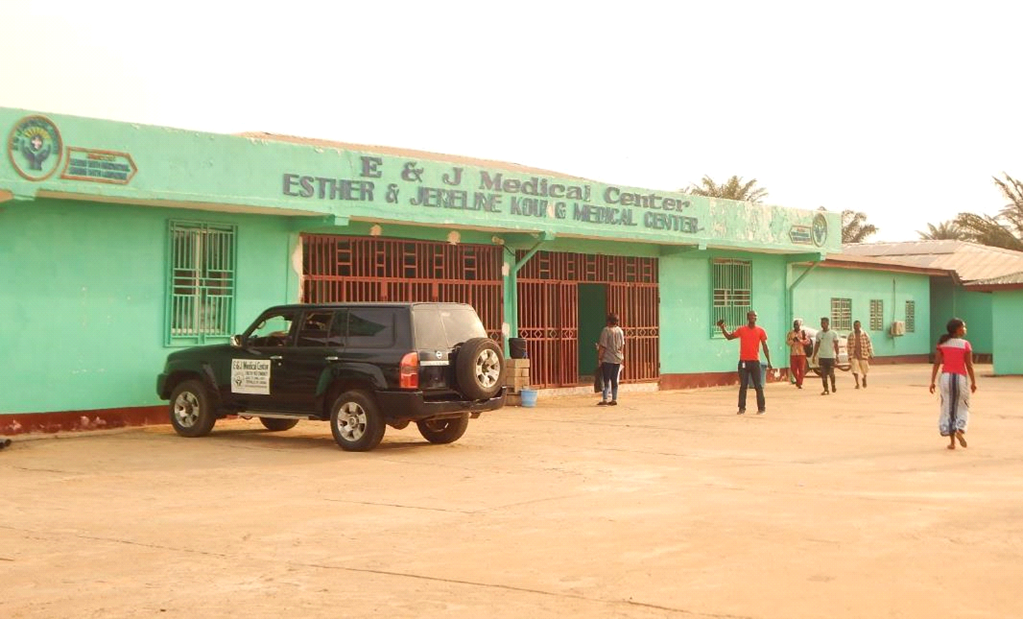MONROVIA, Montserrado – When Rep. Jeremiah Koung was campaigning for a seat in parliament in 2011 elections, he promised better health care for his constituents through a private hospital run by a foundation named after his mother and daughter.
The hospital, called E&J Medical Center, was built in 2006 by Koung, Nimba’s first district representative, through the Esther and Jereline Foundation. The 125-bed medical facility has become the third referral hospital in Nimba, after the Ganta United Methodist Hospital and Jackson F. Doe Memorial Hospital in Tappita.
Unlike public health facilities in Liberia, which are operated by the government and where all services provided free, E&J Medical Center charges for some services, though it offers others like maternal care for free.
It has also received some public funding to support its operations—and that is where the controversy lies. The code of conduct for public officials, which covers members of parliament, says that public money should not support the financial interests of politicians. The law says that all public officials and employees of government are to take decisions solely in the interest of the public good.
“Public officials and employees of government shall not place themselves under any financial obligations or other situations of conflict that impair or are likely to impair the performance of their official duties,†the law states, adding that: “They shall use allotted resources only for the authorized public purposes for which they are provided.â€
The law also says, “No public official or employee of government should use an official position to pursue private interests that may result in conflict of interest.â€
Despite the code of conduct, there are several instances of politicians using their influence during budget discussions to make allotments for their private companies or foundations. Koung’s E&J Medical Center is one of those. Up to 2017, the hospital has received US$300,000 from the national budget, through an annual allotment from the Ministry of Health.
“Until the establishment of the E&J Medical Center, we all here went to the Ganta United Methodist Hospital for treatment, especially for critical illnesses, and we got better treatment,†Anthony Yiligon, a resident of Ganta, said in an interview.
The Ganta United Methodist Hospital was constructed in 1926 by George Harley, an American missionary. It has since been operated by the United Methodist Church in Liberia and is subsidized by the government.
The E&J Medical Center’s chief financial officer, Ebenezer Tokpah, said patients are charged for services mostly to pay for the cost of running the hospital, but fees are dependent on the ability of the patient to pay.
“We live in a community where the income of the people sometimes stops them from seeking health services. So, on the basis of that, we look at their conditions, and then, we levy what is called charges on them in fees. Sometimes, it’s almost like free,†Tokpah said.
He said L$14.4 million (US$103,597) is generated annually in fees for services rendered at the hospital, in addition to the government’s budgetary support of US$25,000 annually, making its total income US$128,597. However, he said a total of US$540,000 would be required annually to run the hospital properly. This means that the lawmaker does not generate any financial profits from the establishment, although he may use it as a political tool to win the votes of his constituents.
The hospital’s chief financial officer also added that maternal health services at the hospital were provided free to pregnant women. He said except instances of complications during pregnancy or deliveries where the hospital shares cost with patients, all maternal services are not chargeable. Free maternal care was among Koung’s campaign promises during the last legislative election campaign.
Dr. Peter George, the E&J Medical Center’s chief medical director, also disclosed in an interview that the hospital partners with the American College of Surgeons and Hernia International to conduct free surgical missions each year. George said the aim of the surgical mission is to provide free surgical operations to Liberians.
Anthony Glee, another citizen of Nimba’s first district residing in Monrovia, said it would have been better if the lawmaker had used his influence to increase government’s allotments for the Ganta United Methodist Hospital, rather than using the public’s money to fund his personal institution.
The Ganta United Methodist Hospital receives the same allotment of US$25,000 in the national budget. This, however, does not raise any conflict as the establishment is a non-profit without any links to any lawmakers or officials in the government. The hospital’s administrator, Allen Zomonway, declined to be interviewed for this story.

The Ganta United Methodist Hospital is a private hospital in Ganta operated by the United Methodist Church. Photo: Arrington Ballah
Koung did not respond to several requests for comment on the hospital in time for publication, but former House Speaker Emmanuel Nuquay, whose private foundations also received budget allocations, denied that the action was a conflict of interest, as prescribed by the code of conduct. Nuquay said all transactions that passed through the budget process is considered legal.
“The budget is a law passed by the Legislature and approved by the president. So, all the transactions are legal,†he said.
During his tenure as chair of the Committee on Ways, Means and Finance Committee at the House of Representatives, Nuquay presided over budget discussions and made allotments to institutions linked to himself or other politicians.
Among them were Radio Gbasue, which he privately established in 2011 for political promotion in his district; Radio Joy Africa, which provided him political promotions, and Trinity Bible College and School of Business in Harbel, owned by Margibi Senator Jim Tornonlah.
In two separate budget years between 2011 and 2013, Radio Gbasue received an allotment of US$60,000, while nearly US$30,000 was allotted to Radio Joy Africa. Trinity Bible College and School of Business received US$50,000 in the 2013/2014 fiscal budget.
In the same year of the allotment, Nuquay picked Tornonlah as his political choice for the county’s vacant senatorial seat. Tornonlah also did not comment on the story, but Nuitah Womgbah, the communications strategist of Trinity Bible College, dispelled rumors that the allotment made by the government was used to fund Tornonlah’s senatorial campaign.
Oscar Cooper, another senator in Margibi, operates a private rubber farm in Cinta. A school and a clinic on the farm for his workers and their families also benefited from allotments in the national budget.
Cooper dismissed the suggestion that receiving government funding for the hospital and clinic on his farm conflicted with his position as a senator. He said the two institutions operated under the Adella Cooper Foundation, a non-profit organization managed by his wife, and provided services to several other residents of nearby towns and villages that were not employees or dependents of his employees.
While the school remains operational and providing education for over 300 children of his employees, the clinic has remained closed since the government cut its subsidy support in 2014. Sen. Cooper attributed the closure of the clinic to the Ebola pandemic which struck the country in 2014.
“We closed down in 2014 because we didn’t know about Ebola and didn’t want the people to catch Ebola,†Cooper said.
Up to 2014, the school and the clinic jointly benefited from a total amount of at least US$100,000.
While such cases may violate a code of conduct that aims to avoid conflict of interest, it is not clear that they are illegal. The chairman of the Liberia Anti-Corruption Commission, James Verdier, said in an interview that while conflict of interest undermines one’s professional integrity, it is not a criminal offense. He added that the commission had received no report of such conflict of interest by lawmakers.
But Verdier’s agency is not responsible for enforcing the code of conduct. That responsibility lies with the Office of the Ombudsman, which has never been set up since the code of conduct was passed as law. Former President Ellen Johnson Sirleaf appointed three members to head the office in 2017, shortly before her term ended. However, the Senate delayed in approving Sirleaf’s appointments. Since taking office, Pres. George Weah has not yet appointed any officials to head the agency.
This story was produced by The Bush Chicken. It was written as part of Wealth of Nations, a pan-African media skills development program run by the Thomson Reuters Foundation in partnership with the African Centre for Media Excellence. More information at www.wealth-of-nations.org
Featured photo by Gbatemah Senah




